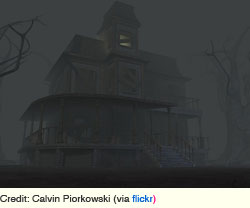 You know I love Halloween, right? Last year I wrote about selling haunted houses. This year it’s Halloween IP. We have two suits queued up in Dockets regarding trademark of Halloween Haunted House brands. It’s time for some trademark awesomeness: who owns the right to scary names?
You know I love Halloween, right? Last year I wrote about selling haunted houses. This year it’s Halloween IP. We have two suits queued up in Dockets regarding trademark of Halloween Haunted House brands. It’s time for some trademark awesomeness: who owns the right to scary names?
First up with Happy Halloween, Inc. [seriously] v. Screams, LLC [no, seriously]. Both parties run haunted houses in Texas. According to the complaint, Happy Halloween, Inc. had hosted a website at screams.com for 14 years. Screams, LLC, filed an action to transfer that domain, alleging cyber-squatting and trademark violation. Screams LLC registered the mark “Screams” with the USPTO. The registration was filed on July 15, 1996, and its first use in commerce is listed as May 18, 1996. Happy Halloween registered the domain name screams.com on January 22, 1997, according to the complaint. So, while Screams was technically first, it’s sat on this for 14 years with no action — laches, anyone? Happy Halloween claims that the term “screams” is a “generic term characteristic of the Halloween season.” It denies that it is cybersquatting, and considering the facts, that seems pretty clear.

